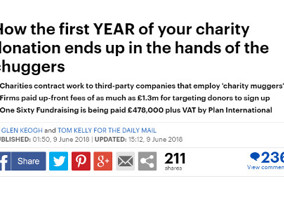Face-to-face fundraising is still being marred by the ‘chugger’ narrative because charities are not learning from their mistakes, Unicef's global head of street fundraising has said.
Speaking at the International Fundraising Congress in Holland yesterday, Daniel McDonnell, global face-to-face specialist at Unicef, said the fundraising channel carried negative connotations, even in emerging fundraising markets, due to charities oversaturating markets and not doing enough mystery shopping.
McDonnell said that many charities were still following an old model of face-to-face fundraising that doesn't properly invest in training or mystery shopping.
“For the majority of operations around the world, face-to-face is a bit of a production line. We’re not thinking about the quality of the people that we’re bringing in, we’re thinking about the quantity,” he said.
“Getting them out on the doors and the streets. Training them up as quickly as we can. Getting them to be productive as quickly as possible and then, if they don’t perform for two weeks, we’re firing them and then going through the whole process again. “
McDonell said this was “not sustainable at all” and was damaging charity brands, both in the UK and around the world.
“The basic face-to-face model is very much a hire-and-fire cycle," he said. "We’re leaking fundraising skills and the way that we’re running it as an operation globally is definitely damaging our brands, both as agencies and charities."
He said that the “hire-and-fire” model was helping to not only maintain the idea of the "chugger" – charity mugger – among the media and public in established markets such as the UK, but was also helping fuel and spread it in emerging markets around the world.
“This chugger thing, it’s the perception of face-to-face fundraisers and there has been media exposé after media exposé around the world about this, particularly in the UK," he said. "The really scary thing is that it’s popping up in country after country now. History is repeating itself over and over again.
“It’s because we’re just doing the numbers game again, the hire-and-fire cycle, with bad man-management and, as they say, those who ignore history are doomed to repeat it. That’s the situation we’re in around the world.”
McDonnell also said that globally, in his experience, just 5 per cent of charities were conducting proper mystery shopping of their face-to-face fundraisers.
“If your face-to-face fundraisers are having 100,000 conversations a month, then you should be mystery shopping 1,000 of those conversations. I know for a fact that’s not happening anywhere in the world.”
Offer fixed, long-term contracts for better results
Thetis Kosmopoulou, first engagement manager with Greenpeace, who was also presenting alongside McDonnell, said that at her organisation they had decided to break this cycle by offering face-to-face fundraisers proper pay and abolishing performance-based bonuses.
“We offer a fixed, long-term contract to our face-to-face fundraisers, including bonus incentives that aren’t necessarily based on performance. We want long-term good donors and long-term, stable performers and so we’re offering job security and stability,” she said. “Which is quite a contrast with what happens with many face-to-face programmes. “
She said that in her analysis of Greenpeace's face-to-face teams around the world, the teams that actually performed the best offered no commission-based incentives at all.
“Bonus incentives damage productivity, and actually our programmes with the best results, return on investment and least complaints don’t offer commission and they don’t offer financial bonuses”.
Kosmopoulou said that face-to-face is still one of the most viable and successful acquisition channels available to charities, but that it needs to change in order to survive.
“Face-to-face needs to change. The marketplace has changed, as have donor’s expectations and we’ve got to get with the times.”
|
Related articles












